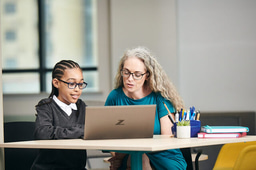Closing the gap: new toolkit for better educational outcomes

One responsibility of being a SENCO is ensuring you have the right targeted interventions in place to support students in your school. But with the busy reality of school life, sometimes keeping up to date with the latest advice and research into what works best, understanding an existing intervention or finding the time to assess whether it is working, can be challenging.
“A lot of schools end up with a huge arsenal of targeted interventions, but some of them might have been implemented 10 years ago and no one's ever gone back to say what was the evidence for that?” said Professor Jo Van Herwegen.
Jo is a Professor of Developmental Psychology and Education at University College London (UCL). Recently, she was the principal investigator on a project called MetaSENse, identifying targeted interventions for improving educational outcomes amongst children and young people with SEND aged 4 to 25. Alongside a report, the project includes a new searchable ‘toolbox’ database of interventions evaluated by research.
The project was co-produced with SENCOs, who, Jo explained, said that finding evidence for a new intervention could be tricky when there is so little time in a SENCOs day. “Say I'm going to go to my head of school to say, ‘I would like to buy this particular intervention.’ Often, [the head of school] will say ‘Right, go and find the evidence that it actually works.’ And so, SENCOs then do this, but often they don't have access to the evidence because it's in published papers. The best evidence you have is if you find another school using it and they think it's OK. With the database, we can give SENCOs a tool that means they can go to their head of school and say ‘I’ve done the research. This is what the research says.’”
The inspiration behind the project came from a conference Jo attended. Roughly one in 100 children in the UK have autism. Another one in 10 children in UK schools have dyslexia, which is a similar amount to the amount that have dyscalculia.
And so, I was sitting there thinking, ‘That’s more than one child per classroom, right?’ And these children will likely have very different needs, with a list [of targeted interventions]. And then you think about teachers being already overstretched, having to deliver a very full curriculum.”
With the likelihood of a classroom with such a diverse set of needs being high, Jo began to wonder if there was much research on whether there are targeted interventions that help with the educational outcomes of multiple children with SEND.
Previous literature reviews have often focused on what works for autistic children, for children with learning difficulties. But what if we did a big review where we are no longer looking at specific categories but see what can raise educational outcomes for all children in SEND."
Jo found that Lego therapy was an example of an intervention that had the potential to benefit more than one group of children with SEND. “Lego therapy is very efficient for helping with communication needs for autistic children,” she explained. “But I also knew from work I was doing on mathematical development and from research by colleagues that playing with Lego can help improve children's mathematical outcomes. So, could an intervention a target intervention like Lego therapy be beneficial for different groups of students for different reasons?”
FINDINGS:
The group hopes to continue to look at interventions, such as Lego play, that can benefit multiple groups of children with SEND. But this latest study focused on what research on educational outcomes was already out there and it made some interesting discoveries.
For starters, when it came to studies on educational outcomes, a lot of research focused on dyslexia, while the group found very little research into learning interventions for students with ADHD, autism, or Down’s syndrome. “We found that only six studies have looked at individuals with Down’s syndrome,” explained Jo. “We know that those children often have lower educational attainment, so you would think that there would be a bit more research within the area. But that's not the case at all.”
When it comes to educational outcomes, we know the gap for SEND continues to increase, and yet the research for those SEND groups is pretty limited. So that's where we know we might need to put our focus on more going forward.”
Jo also noted that a lot of CPD focuses on attributes and how to spot if a child has SEND, rather than providing effective strategies to help them with their educational outcomes.
"Most of the time, when we talk about autism, we talk about repetitive behaviours, communication needs, etc. But it doesn't tell you much about how they learn or how these aspects impact learning. And it is the same thing for Down’s syndrome. Perhaps you now understand Down’s syndrome - you know they've got language needs or memory difficulties. Often the CPD is based on what is it and not based on what it means. What do these cognitive difficulties mean for learning?”
“So, I think having more broader CPD on learning mechanisms, a bit of child development in there or neuroscience in a much broader way might help, compared to just focusing on what's dyslexia and what's dyscalculia and how do I identify them in my classroom, that's important.”
Often, if an intervention has been in place for a long time in a school, teachers or teaching assistants may not fully understand why they are implementing a certain intervention. Jo explained that this can “water down” the effect of an intervention, which is another way the MetaSENse toolkit can help, as it summarises the papers that are included in the database.
The MetaSENse study has shown that research into the educational outcomes of children with SEND needs to improve in many ways. From covering a more diverse range of groups, such as more studies into outcomes for children with Down’s Syndrome or autism, to moving research from identifying SEND to what it means for a child’s learning. But it has also provided a place for busy SENCOs and practitioners to find the most up to date research so that they can implement the best strategies for their students in school.
We are aware that this is not finished work, and we will do our best to update the toolbox continuously,” Jo said. “But it's a starting point that I think will help schools or SENCOs reflect on the target interventions they use.”
If you are interested in the MetaSENse project, check out their website. If you have any further questions about MetaSENse, email Jo at j.vanherwegen@ucl.ac.uk





Please sign in or register for FREE
If you are a registered user on SEND Network, please sign in